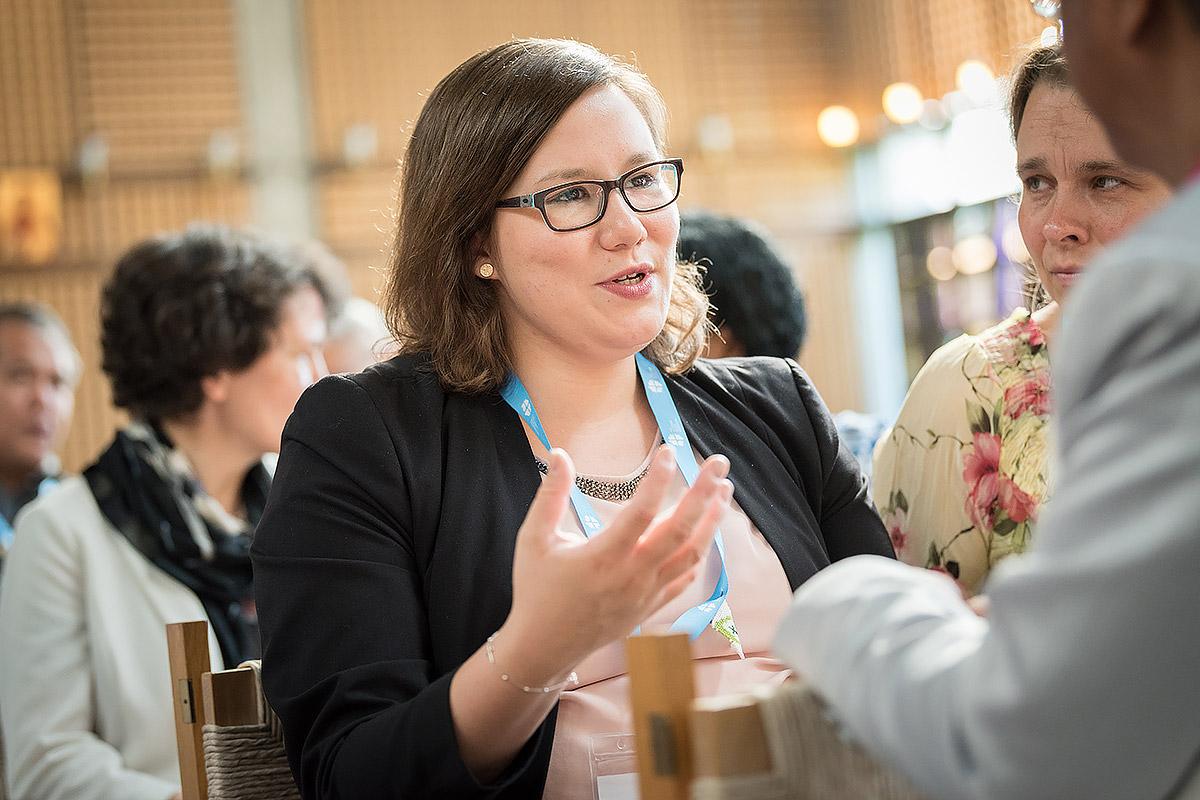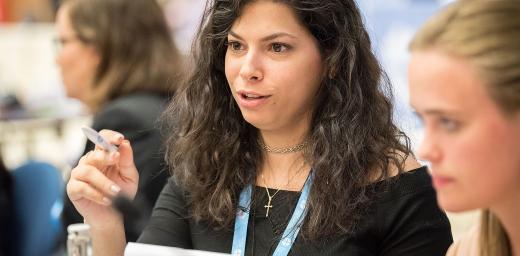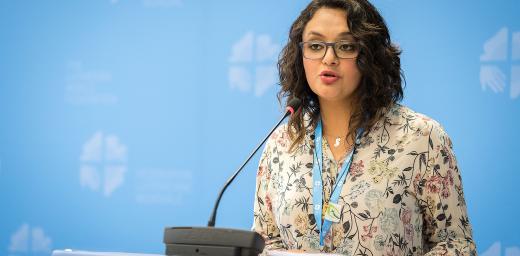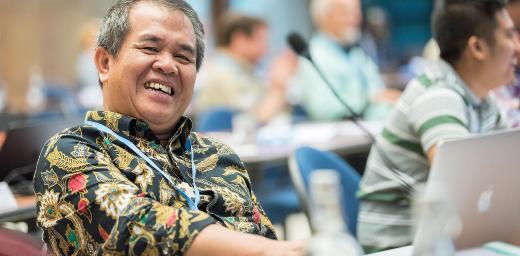Putting the faith of young people on the agenda

Julia Braband is one of the young adults elected to the LWF Council last year. She represents Central Western Europe in this governing body. Photo: LWF/Albin Hillert
Interview with Council member Julia Braband
(LWI) – Julia Braband (25) talks to the Lutheran World Information about the effect of youth participation in church bodies, the stand of her church towards right-wing populist movements and her personal experiences in church leadership positions.
Braband, a trained nurse, currently studies theology and represents the region of Central-Western Europe in the Council of the Lutheran World Federation (LWF).
As one of about 760,000 members of the Evangelical Church in Central Germany, she lives in an East German region that belonged to the Communist German Democratic Republic (GDR) until the German reunification in 1989. Today, one of the characteristics of this region is that most of its citizens have no religious affiliation. In the federal state of Thuringia this is true for about 70 percent of the population, in Saxony-Anhalt atheist numbers reach 80 percent.
Strengthening youth participation
Julia Braband, does your church, the Evangelical Church in Central Germany, meet the youth quota of 20 percent set by the LWF?
In our Synod, which consists of 80 members, young people under 27 years of age have six seats with the right to speak and to propose, two of them with the right to vote. The candidates are nominated by the Youth Convention (four seats) and by the university student congregations (two seats). Young people are also represented in the bodies formed by the Synod. These include the church board, the executive committee and various other committees.
All in all, this means that we are in a comparatively good position in my church. However, we have not met the LWF youth quota yet.
What is the situation in the other 10 LWF member churches in Germany?
Very diverse. There are churches without any youth participation in their governing bodies and there are churches with very good involvement – the spectrum is broad. However, none of the churches has met the quota set by the LWF so far.
In your experience, what obstacles stand in the way of youth participation – and what solutions would there be?
Often the older generation does not trust young people to be able to take on leadership positions. We often hear “you are too young, you have too little experience”. And on the side of young adults there is often little interest in taking on church leadership positions.
Personally, I see the biggest difficulty in the fact that in our members of the churches’ governing bodies must be at least 18 years of age to be eligible for these offices. For most people, this is the beginning of a phase of their lives in which they graduate, study or train and often move to another city. The church leadership's desire for continuity and as few changes as possible in the composition of boards can therefore often not be met.
Young people are not the leaders of some distant future. Today is the time to involve them in shaping the future of the church together.
In my church awareness of this has grown, although the desire for continuity has not been lost: the Youth Convention now sends young adults for 2 years instead of the usual 6 years. You can then be re-elected or confirmed. First, however, a young person makes a manageable commitment, which is also clear to other older committee members.
I think we need this kind of change of perspective and a cross-generational view in other respects as well. Young people are not the leaders of some distant future. Today is the time to involve them in shaping the future of the church together.
What concrete steps can be taken in this direction?
I am very grateful that the faith of young people will be discussed at the Synods of the United Evangelical Lutheran Church of Germany (VELKD) and the Evangelical Church in Germany (EKD), which will meet in November. This has never happened before! And some impulses for this actually came from the LWF Assembly in Windhoek.
Among other things, the legal framework for youth participation is on the agenda of these synodal sessions. Since the VELKD has not yet provided for any youth seats in its synod, a first step would be to have young people there at all. I would like to see as many as seven seats for youth. Then each member church could send a young adult. To reach the LWF youth quota, we would need three more seats on top of that.
Resisting right-wing populism
In last year’s federal elections the right-wing Alternative for Germany (AfD) party won 16.9 percent of the votes in Saxony-Anhalt and 22.5 percent in Thuringia. The national average was 11.5 percent… How does your church deal with right-wing populist tendencies?
The church leadership of the Evangelical Church in Central Germany takes a clear stand against right-wing populism. Since 2015, we have been running a campaign called “Nächstenliebe verlangt Klarheit” (Loving your neighbor requires a clear stand), which opposes populist and right-wing extremist movements.
Nevertheless, we know that there are quite a number of AfD voters in our congregations as well. I think the church should not ignore them but should rather enter into a dialogue with them about their fears and uncertainties. But there is no simple solution for this and the situations remains complicated.
My church has tried different approaches. In Gera, a city with an above average proportion of AfD voters, the Ecumenical Academy has started a series of events held on church ground to discuss the policy areas of that party. Experts in the fields of theology, sociology and political science there engage with politicians – explicitly also those of the AfD.
Our Youth Associations have taken a totally different approach. They adopted resolutions banning any collaboration with the AfD whatsoever. This also extends to events to which members of parliament of all parties used to be invited to.
We notice that young voters tend not to vote for right-wing parties as often as older people do. In my opinion that might be connected to the fact that they – unlike their parents and grandparents – grew up in a country not surrounded by walls. They had the opportunity to travel, to overcome reservations and to become more cosmopolitan and open-minded.
Personal experience in leadership positions
Does the experience of accepting responsibility and taking a stand also help to become more open-minded? What are your personal experiences in church leadership positions?
Accepting responsibility has certainly strengthened my personal conviction that young people can make a valuable contribution – if only because I have a different perspective on life and society than someone who has been working in certain settings for many years.
I have been involved in church leadership for 8 years, in the case of the LWF for 5 years. At first, I didn't really expect my voice would be heard. In the meantime, I have gained a lot of self-confidence and I don't let myself be taken in or dissuaded from my convictions easily.
I have also experienced that the voice of young people is well perceived when they are present as a group. We then can take action more easily and can influence the direction in which we want to go. That is much harder when you're on your own.
Thus my appeal to all churches: Take young people seriously and involve them as full members who today - here and now - want to help shape the future of their church!
Thus my appeal to all churches: Take young people seriously and involve them as full members who today - here and now - want to help shape the future of their church!
The Lutheran World Federation is a global body that shares the work and love of Christ in the world. In this series, we profile church leaders and staff as they discuss topical issues and set out ideas for building peace and justice in the world, ensuring the churches and communion grow in witness and strength.





